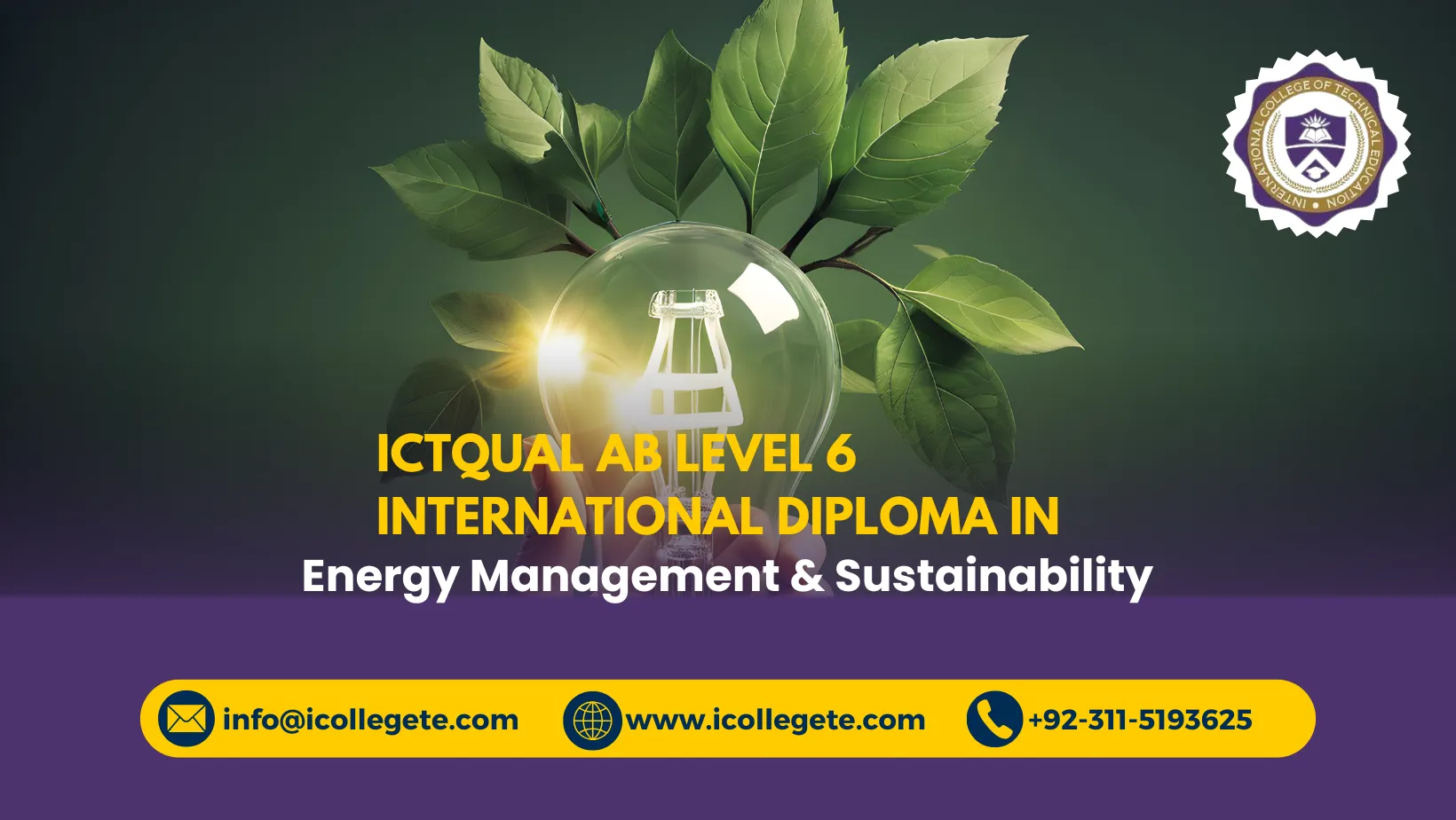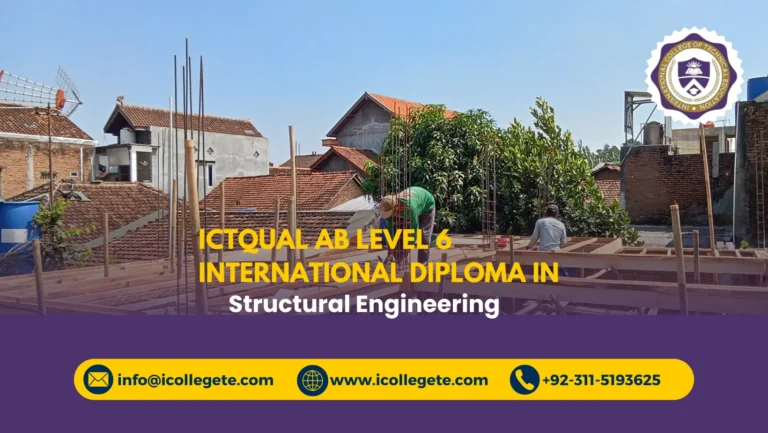The ICTQual AB Level 6 International Diploma in Energy Management & Sustainability is an advanced qualification designed to equip learners with the knowledge, skills, and strategies required to manage energy resources efficiently and promote sustainable practices across industries. ICTQual AB Level 6 International Diploma in Energy Management & Sustainability responds to the global demand for professionals who can address the challenges of energy efficiency, renewable resource utilization, and environmental responsibility. ICTQual AB Level 6 International Diploma in Energy Management & Sustainability integrates technical expertise, management principles, and sustainability frameworks to develop competent leaders capable of driving the transition towards cleaner, greener, and more sustainable energy systems.
ICTQual AB Level 6 International Diploma in Energy Management & Sustainability provides a comprehensive understanding of global energy systems, including renewable and non-renewable energy sources, carbon management, and environmental impact assessment. Students learn how to design and implement energy-saving strategies, evaluate sustainability projects, and apply international energy management standards. The curriculum combines theoretical foundations with real-world applications, ensuring learners are ready to meet the dynamic needs of both private and public sector organizations.
Energy management and sustainability are central to modern business operations, urban development, and industrial growth. ICTQual AB Level 6 International Diploma in Energy Management & Sustainability prepares learners to analyze, plan, and manage energy resources effectively while aligning with environmental laws and corporate sustainability goals. Graduates emerge as professionals capable of influencing organizational energy policies, leading green projects, and contributing to sustainable development globally.
The ICTQual AB Level 6 International Diploma in Energy Management & Sustainability empowers professionals to become innovators and change agents in the energy sector. By mastering advanced energy efficiency tools, renewable energy integration, and sustainable development practices, learners gain the expertise needed to create positive environmental and economic impacts, ensuring a more resilient and sustainable future for all.
Course Overview: ICTQual AB Level 6 International Diploma in Energy Management & Sustainability
The ICTQual AB Level 6 International Diploma in Energy Management & Sustainability is a globally recognized qualification designed to equip learners with the essential knowledge, skills, and strategies to manage energy resources efficiently and promote sustainable practices across industries. ICTQual AB Level 6 International Diploma in Energy Management & Sustainability provides an in-depth understanding of energy systems, renewable energy technologies, sustainability frameworks, and environmental policies that shape modern energy management.
Learners will explore the principles of energy efficiency, sustainable resource utilization, and carbon footprint reduction, gaining a strong foundation in both the technical and managerial aspects of energy systems. The ICTQual AB Level 6 International Diploma in Energy Management & Sustainability integrates international standards and best practices, preparing professionals to take leadership roles in the transition toward clean and sustainable energy solutions.
Through ICTQual AB Level 6 International Diploma in Energy Management & Sustainability , participants develop analytical, strategic, and decision-making skills required to address real-world energy challenges. The curriculum focuses on global energy trends, environmental impact assessment, and sustainable business models, making graduates valuable assets to organizations aiming to achieve energy efficiency and environmental compliance.
ICTQual AB Level 6 International Diploma in Energy Management & Sustainability serves as a bridge between technical expertise and sustainability leadership, empowering learners to design, implement, and manage innovative energy solutions for industries, governments, and communities worldwide. Whether you are an engineering professional, sustainability consultant, or energy policy advisor, this program provides the pathway to advance your career in the fast-growing field of Energy Management and Sustainability.
Course Study Units
This qualification, the ICTQual AB Level 6 International Diploma in Energy Management & Sustainability, consists of 36 mandatory units.
Year 1 – Foundation in Energy Management & Sustainability
- Principles of Energy Systems
- Introduction to Sustainability Concepts
- Energy Auditing Fundamentals
- Environmental Science and Climate Principles
- Energy Conversion and Efficiency Basics
- Renewable Energy Overview
- Health, Safety, and Environmental Awareness
- Energy Measurement and Instrumentation
- Laboratory Techniques in Energy Systems
- Technical Report Writing
- Introduction to Energy Simulation Software
- Fundamentals of Carbon Management
Year 2 – Intermediate Energy Management & Sustainability
- Advanced Energy Auditing Techniques
- Sustainable Energy Technologies
- Energy Management Systems (EnMS)
- Environmental Impact Assessment and Compliance
- Energy Efficiency Optimisation Strategies
- Carbon Reduction and Climate Mitigation Practices
- Smart Grids and Energy Distribution
- Process Control and Automation in Energy Systems
- Project Planning and Technical Communication
- Quality Control and Assurance in Energy Projects
- Data Analysis and Monitoring for Sustainability
- Energy Policy, Regulations, and Standards
Year 3 – Advanced Energy Management & Sustainability
- Strategic Energy Management and Optimisation
- Energy Project Management and Leadership
- Emerging Technologies in Renewable and Sustainable Energy
- Energy Storage and Grid Integration
- Sustainability Reporting and Corporate Responsibility
- Risk Assessment and Hazard Analysis in Energy Projects
- Advanced Laboratory Techniques and Field Testing
- Carbon Accounting and Life Cycle Assessment
- Supply Chain and Logistics in Sustainable Energy
- Capstone Project in Energy Management & Sustainability
- Professional Development and Leadership in Energy
- Strategic Decision-Making for Energy Efficiency
Course Learning Outcomes of ICTQual AB Level 6 International Diploma in Energy Management & Sustainability
1. Understanding Core Principles of Energy Management
- Demonstrate a comprehensive understanding of energy generation, consumption, and conservation.
- Explain the fundamentals of global energy systems and sustainable development.
- Identify key sources of renewable and non-renewable energy.
- Analyze the impact of energy use on the environment and climate change.
- Apply principles of energy efficiency in industrial, commercial, and residential sectors.
- Evaluate strategies for optimizing energy consumption and reducing waste.
- Understand the role of policy, regulation, and governance in energy management.
2. Mastery of Renewable Energy Technologies
- Explore various renewable energy systems such as solar, wind, hydro, and biomass.
- Assess the feasibility of implementing renewable energy technologies in different contexts.
- Compare traditional energy systems with modern sustainable alternatives.
- Understand the design, installation, and maintenance of renewable energy systems.
- Apply analytical tools to measure renewable energy efficiency.
- Integrate renewable solutions into existing infrastructure.
- Evaluate the economic and environmental benefits of renewable technologies.
3. Proficiency in Sustainability and Environmental Management
- Define sustainability principles and their application in energy management.
- Analyze environmental policies and international frameworks for sustainability.
- Assess environmental risks associated with energy projects.
- Implement sustainability reporting and environmental auditing techniques.
- Develop sustainable strategies for industrial and organizational practices.
- Promote eco-friendly initiatives and sustainable workplace behavior.
- Understand the circular economy and resource efficiency concepts.
4. Competence in Energy Auditing and Efficiency Assessment
- Conduct energy audits for buildings, factories, and industrial setups.
- Identify inefficiencies and recommend solutions for energy optimization.
- Utilize tools and software for energy data analysis and performance monitoring.
- Develop comprehensive energy audit reports for management decisions.
- Assess energy cost-saving opportunities and performance indicators.
- Implement monitoring systems to maintain energy efficiency standards.
- Apply international best practices in energy auditing and verification.
5. Strategic and Policy Development Skills
- Formulate energy management strategies aligned with sustainability goals.
- Interpret global energy policies and their implications for local industries.
- Develop organizational energy management frameworks.
- Evaluate government incentives and policy tools for sustainable energy.
- Support organizations in adopting green policies and technologies.
- Prepare sustainability plans aligned with SDGs (Sustainable Development Goals).
- Advise on policy improvements for promoting sustainable energy.
6. Analytical and Research Competence
- Conduct independent research on energy and sustainability issues.
- Analyze real-world data to develop energy performance models.
- Use statistical and computational tools for sustainability analysis.
- Critically evaluate energy management case studies.
- Apply evidence-based approaches to decision-making in energy systems.
- Present research findings through technical reports and presentations.
- Contribute to innovative projects focused on clean and efficient energy solutions.
7. Professional Development and Ethical Practices
- Demonstrate professional ethics in managing energy and sustainability projects.
- Communicate effectively with stakeholders, engineers, and policymakers.
- Exhibit leadership and teamwork in sustainability initiatives.
- Adapt to emerging global trends and technologies in energy management.
- Uphold ethical, social, and environmental responsibilities in all practices.
- Develop a lifelong learning attitude to continuously enhance skills.
- Promote workplace safety, environmental stewardship, and sustainable values.
Entry Requirements for this Course
- Level 5 diploma or equivalent qualification in engineering, management, or environmental studies
- Professionals with relevant work experience in energy or sustainability fields are encouraged to apply
- Proficiency in English communication and technical writing
- Strong analytical and problem-solving abilities
- Basic understanding of environmental science and energy systems
- Interest in renewable energy, sustainability, and policy development
- Computer literacy and ability to use energy management software
- Commitment to sustainable practices and professional ethics
- Ability to work collaboratively in multidisciplinary teams
- Leadership potential and innovation mindset
- Motivation to contribute to environmental and energy-related projects
- Understanding of organizational and industrial operations
- Awareness of global energy challenges and trends
- Strong research and analytical orientation
- Willingness to engage in practical and applied learning activities
Course Benefits of ICTQual AB Level 6 International Diploma in Energy Management & Sustainability
1. Advanced Knowledge in Energy Management
- Gain in-depth understanding of global energy systems, policies, and sustainable practices.
- Learn the fundamentals of renewable energy sources and energy efficiency technologies.
- Develop strategic skills to plan, implement, and manage energy conservation programs.
- Understand carbon management, climate policies, and global sustainability frameworks.
- Acquire expertise in sustainable energy auditing and lifecycle energy analysis.
2. Enhanced Career Opportunities
- Qualify for high-demand roles such as Energy Manager, Sustainability Consultant, or Environmental Engineer.
- Open pathways to work in renewable energy, oil & gas, and environmental management sectors.
- Strengthen your portfolio with an internationally recognized qualification.
- Gain eligibility for promotions and leadership positions in energy-related organizations.
- Increase employability in global industries focusing on sustainable energy and environmental innovation.
3. Professional and Global Recognition
- Earn an internationally accredited diploma valued by employers worldwide.
- Enhance credibility with industry-recognized certification in sustainability management.
- Access membership opportunities in professional bodies like the Energy Institute (EI).
- Recognition for compliance with international standards in energy and environmental management.
- Develop a professional reputation as an expert in sustainable energy systems.
4. Practical and Technical Skill Development
- Gain hands-on training in energy auditing, efficiency analysis, and sustainability reporting.
- Learn to use modern tools for energy modeling and performance evaluation.
- Develop problem-solving skills for tackling global energy challenges.
- Build technical expertise to design and implement renewable energy systems.
- Apply learned knowledge to real-world sustainability projects and initiatives.
5. Contribution to Global Sustainability Goals
- Play a vital role in promoting clean energy and sustainable development worldwide.
- Contribute to reducing carbon emissions and achieving global net-zero goals.
- Support organizations in transitioning to green and sustainable energy solutions.
- Influence corporate sustainability strategies and environmental policy decisions.
- Become a key advocate for energy efficiency, resource conservation, and environmental responsibility.
Why Someone Should Choose this Course
- Aligns with global sustainability and energy management standards
- Offers practical learning aligned with real-world applications
- Bridges the gap between technical and managerial energy expertise
- Prepares professionals for high-demand sustainability roles
- Focuses on renewable energy, green innovation, and environmental efficiency
- Provides opportunities for professional networking and career advancement
- Enhances employability across multiple industries worldwide
- Encourages ethical leadership and environmental stewardship
- Suitable for both technical and non-technical professionals
- Offers career flexibility across public, private, and non-profit sectors
- Develops future-ready professionals for the global energy transition
- Equips learners to make a meaningful impact on climate change
- Taught by experienced industry practitioners and educators
Who Can Enroll in this Course
The ICTQual AB Level 6 International Diploma in Energy Management & Sustainability is ideal for engineers, environmental managers, energy auditors, and sustainability professionals seeking to enhance their expertise in energy systems and sustainable development. ICTQual AB Level 6 International Diploma in Energy Management & Sustainability is also suitable for business managers, consultants, and policymakers aiming to integrate sustainability into corporate or governmental strategies.
Graduates of environmental sciences, renewable energy, or engineering disciplines who wish to specialize in energy efficiency and sustainability can also benefit from ICTQual AB Level 6 International Diploma in Energy Management & Sustainability. Additionally, individuals working in construction, manufacturing, or utility sectors can enroll to gain advanced understanding of sustainable energy practices applicable to their industries.
Future Progression for ICTQual AB Level 6 International Diploma in Energy Management & Sustainability
1. Progression to Higher Education
- Learners can advance to Level 7 Diplomas or Master’s degree programs in Energy Management, Environmental Engineering, or Sustainability Studies.
- Opportunities to pursue specialized postgraduate qualifications in Renewable Energy Systems or Green Technology.
- Access to international universities offering MSc programs in Energy & Environmental Management.
- Eligibility for professional certifications in Energy Auditing or Carbon Management.
- Enhanced academic foundation for PhD research in Sustainable Energy or Climate Policy.
- Recognition by global energy and sustainability institutions for further professional growth.
- Pathway to academic careers in research, teaching, or consultancy in sustainability.
2. Career Advancement Opportunities
- Openings for senior positions such as Energy Manager, Sustainability Consultant, or Environmental Advisor.
- Opportunities in renewable energy companies, oil & gas firms, and environmental agencies.
- Advancement to leadership roles in corporate sustainability and energy compliance departments.
- Ability to lead sustainability-driven projects and energy transition initiatives.
- Increased employability in government and private organizations promoting green policies.
- Consultancy opportunities for carbon reduction, waste management, and sustainable operations.
- Global recognition for expertise in sustainable energy practices and resource efficiency.
3. Professional Development Pathways
- Membership eligibility in professional bodies such as the Energy Institute (EI) or International Association for Energy Economics (IAEE).
- Continuous professional development through workshops, seminars, and renewable energy training.
- Access to international conferences on energy efficiency and environmental sustainability.
- Opportunities to collaborate with research organizations and sustainability think tanks.
- Recognition as a certified Energy & Sustainability Professional.
- Development of leadership and policy-making skills for the energy transition sector.
- Preparation for global roles in sustainable infrastructure and green innovation projects.
4. Entrepreneurial and Industry Opportunities
- Ability to start a consultancy firm specializing in energy audits and sustainability assessments.
- Opportunities to develop innovative energy-saving technologies or green startups.
- Potential to work on smart city and sustainable development projects worldwide.
- Access to funding and grants for renewable energy innovation.
- Collaboration with environmental NGOs and international development agencies.
- Ability to create impactful sustainability initiatives within the private and public sectors.
- Entrepreneurial growth in the renewable energy and circular economy industries.
5. Global Career Mobility
- Recognition of qualification by international employers and educational bodies.
- Increased opportunities to work in international organizations such as UN, UNEP, and IRENA.
- Potential to work abroad in countries leading in renewable energy initiatives.
- Access to cross-border sustainability projects in Asia, Europe, and the Middle East.
- Eligibility for global certification programs in sustainable energy management.
- Career flexibility across multiple industries focusing on decarbonization and energy efficiency.
- Pathway to global leadership roles in sustainable energy transformation.




